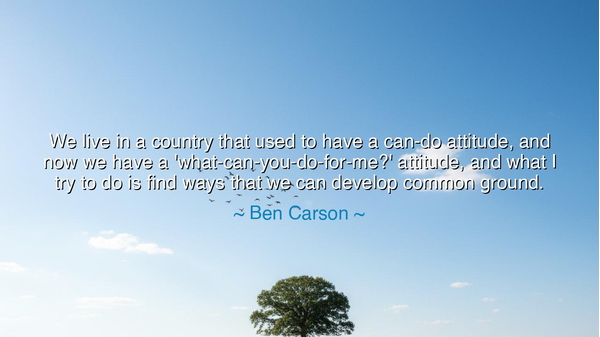
We live in a country that used to have a can-do attitude, and now
We live in a country that used to have a can-do attitude, and now we have a 'what-can-you-do-for-me?' attitude, and what I try to do is find ways that we can develop common ground.






Host: The room was calm, bathed in the soft light from the lamp. Outside, the world had quieted, and the peaceful rhythm of the evening filled the air. Jeeny sat at the table, her fingers lightly tracing the rim of her cup, absorbed in thought. Jack, standing near the window, gazed out at the darkened world, clearly reflecting on something deeper. There was an unspoken understanding between them, as though a deeper conversation was about to unfold.
Jeeny: (breaking the silence, her voice calm but thoughtful) “I came across something by Ben Carson today that really struck me. He said, ‘We live in a country that used to have a can-do attitude, and now we have a ‘what-can-you-do-for-me?’ attitude, and what I try to do is find ways that we can develop common ground.’ What do you think about that?”
Jack: (pauses, his voice thoughtful) “It’s such an interesting reflection, isn’t it? Carson seems to be saying that there’s been a shift in the mentality of society—what used to be a focus on initiative, on people figuring out how to solve problems, has been replaced by a mindset that’s more about entitlement and asking what others can do for us. It’s almost like we’ve lost that spirit of self-reliance and collective effort, and instead, there’s an expectation that others should take care of things for us. Carson’s approach seems to be about finding a way to reconnect with that original, empowered mentality.”
Jeeny: (nodding slowly) “Exactly. There’s a subtle but significant shift in how we approach life and work. In the past, the can-do attitude was about individual effort—people believed they could make things happen on their own, and that sense of determination created a strong, collective drive. Now, there’s more of a focus on asking for help or looking for what others can offer. It’s almost as if society is becoming more focused on the immediate benefit rather than on long-term effort and creating solutions ourselves.”
Host: The stillness in the room deepened as their words settled. Jack turned slightly toward Jeeny, his expression softening as he considered the broader meaning of Carson’s words. Outside, the world had quieted, but inside, their conversation had shifted toward a reflection on individual initiative and the role of common ground in solving problems.
Jack: (his voice quieter now, more introspective) “What strikes me about Carson’s perspective is how he seems to be pointing out that we’ve become more focused on individual needs and less focused on the greater good. People are more likely to ask, ‘What’s in it for me?’ than, ‘How can I help?’ That shift has an impact on how we approach not just our personal lives, but how we tackle societal issues. Finding common ground becomes that much harder when people are mostly thinking about what they can get, rather than how they can contribute.”
Jeeny: (softly) “Yes, and I think it’s also about the sense of shared responsibility. A ‘can-do’ attitude means that we’re all in this together, that we have a collective stake in the outcomes of our actions. When we adopt a ‘what-can-you-do-for-me?’ attitude, it’s much more individualistic. We lose sight of the fact that progress and solutions often require collaboration, compromise, and a willingness to look beyond our immediate needs.”
Jack: (nodding slowly) “Exactly. And I think Carson is really asking us to reconsider how we engage with the world. If we’re all constantly asking what we can get, it’s easy to become stuck in a cycle of dissatisfaction and frustration. But if we shift our mindset to ‘how can we work together?’ or ‘how can we help each other?’, we start to create a culture of cooperation and progress.”
Jeeny: (smiling gently) “Yes. And I think that’s why finding common ground is so important. It’s not just about compromise—it’s about recognizing that the best solutions come when we put aside our individual wants and focus on shared goals. Common ground doesn’t mean everyone gets exactly what they want, but it means that we can come together to create something bigger than ourselves.”
Host: The quiet between them felt deeper now, as their conversation continued to unfold into a reflection on the importance of individual effort and collective action. Outside, the world had quieted, but inside, there was a shared understanding that Carson’s words highlight the need for a shift back to a can-do attitude, one that fosters collaboration, personal responsibility, and a focus on common goals.
Jack: (smiling softly, his voice more assured) “It’s a reminder that when we all focus on contributing, rather than asking what we can get, we create a stronger, more connected society. It’s about working toward something greater than just individual gain.”
Jeeny: (nodding warmly) “Exactly. The true power of progress lies in coming together, finding common ground, and working toward a shared vision for the future.”
Host: The world outside had quieted to a peaceful stillness, but inside, the room was filled with understanding. Jeeny and Jack had uncovered the truth in Carson’s words—that the shift from a can-do attitude to a what-can-you-do-for-me? mindset creates a gap in collaboration and collective effort. True progress comes from a mindset of contribution, common ground, and shared responsibility. The night continued outside, but inside, the room felt full of the realization that collaboration, when rooted in a can-do attitude, has the power to bring about meaningful change.






AAdministratorAdministrator
Welcome, honored guests. Please leave a comment, we will respond soon